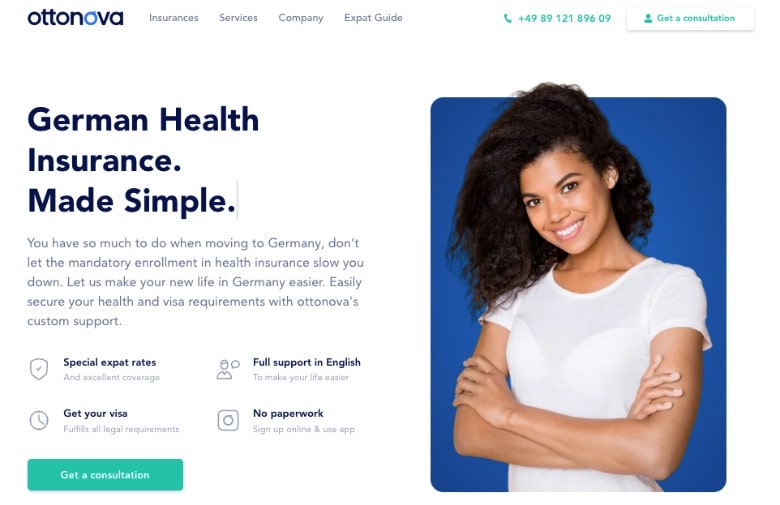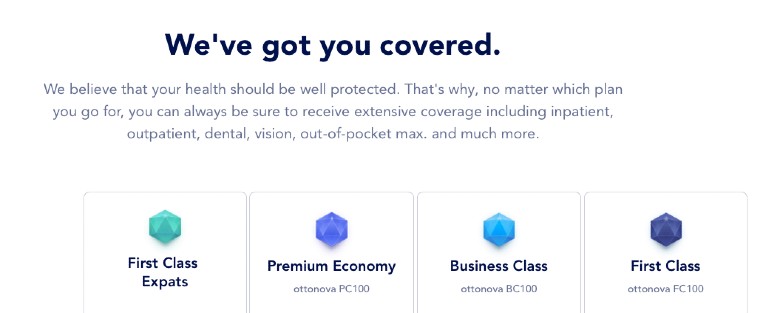Having health insurance is mandatory in Germany. Depending on your situation, you can choose a public or private health insurance provider.
Here are the key takeaways:
- Ottonova is a private health insurance provider that is 100% digital and in English.
- You can apply to
Ottonova if you earn more than 73.800 euros a year, you’re self-employed, a freelancer, or a doctor. - It’s a great option for expats who are in Germany without family and who plan to stay for less than 5 years.
- If you’re planning on staying in Germany for more than five years or moving here with your family, you should consult with Feather. to determine the best option for you.
What is Ottonova ?
Ottonova is a private health insurance company in Germany. It was founded in 2017 and is challenging the status quo of traditional insurance companies. It is the first and only private health insurance company that is 100% digital and officially offers its services and customer support in English. That being said, it is a favorite amongst expats.
Ottonova simplifies the complexity of German insurances, especially for foreigners. On top of that, they offer an exclusive non-EU expat plan at a reduced rate, should you be staying in Germany for less than five years.

How does the German Health Insurance System work?
The German healthcare system is renowned for being one of the best in the world. Yet, like many things in Germany, it is quite complicated. Let us simplify it for you.
Anyone living in Germany and anyone applying for a work visa needs to have certified German health insurance.
There are two types of health insurances in Germany:
- Public health insurance (gesetzliche Krankenversicherung or GKV)
- Private health insurance (private Krankenversicherung or PKV)
You can not always choose which type of health insurance you would like to have, as it depends on your type of employment and your salary.
The cost for public health insurance is based on your salary, whereas private health insurance is based on your age and health.
There is a difference in how treatment costs are handled between public and private health insurance in Germany.
- Public health insurance: You present your public health insurance card at the doctor’s office and they handle the billing to your insurance provider.
- Private health insurance: You need to pay everything up front and you need to take care of requesting reimbursements from your health insurer.
Read Our Related Guide
Who can get Ottonova health insurance in Germany?
You can apply for full private health insurance coverage and, hence for
- you are employed and earn more than 73.800 euros per year before tax in 2025 (Jahresarbeitentgeltgrenze or JAEG)
- you are self-employed (selbstständig)
- you are a freelancer (Freiberufler)
- you are a doctor
There are of course other individual aspects that a private health insurer will check, before signing you up. If you do not qualify for any of the above or other criteria, you must get public health insurance, for example, from Techniker Krankenkasse (TK).
In case, you are still on the job hunt, neither private nor public health insurance might accept you. That is when expat health insurance is your best option. It is temporary health insurance for expats until they find a job and can switch to full-time health insurance.
Feather, who is an expat insurance broker, offers such expat health insurance. You can sign up online in less than two minutes.
Which health insurance is best in Germany?
Whether public or private health insurance is better is a hot topic, also amongst Germans.
The fact is that private health insurance has many benefits, such as faster doctors’ appointments, single rooms in hospitals, treatment by the chief physician, and better coverage.
Should you be young, healthy, and earning well (which we hope you are ☺️), and will only spend some months or years in Germany, private health insurance can be a lot cheaper than public health insurance.
However, should you want to retire in Germany, with age, private health insurance costs could increase compared to public insurance.
We cannot tell you which type of insurance is better for you, as every person is different and health insurance is highly individual. You should know, though, that you cannot change your mind and change to public insurance a year later once you choose private health insurance. It is quite difficult to change from private to public.
Before you wreck your brain on whether you should go public or private, we suggest checking with
Schedule your free Ottonova phone consultation. Don’t worry; they speak English 😉.
Can you apply for your German visa with Ottonova ?
Yes, you can.
Global travel insurance like Mawista, CareConcept, and Cigna might not be enough.
What is covered with Ottonova health insurance?
Ottonova reimburses:
Visits to the doctor: All doctor visits and specialist doctors with a referral from a general practitioner.
Digital calls with doctors: From diagnosis to the treatment plan, to sick note for work,
Hospital care and surgeries: You can request to be treated by the chief physician or surgeon and have the right to a single room.
Dental care: Dental cleanings (twice a year) and tooth fillings and root canal treatments.
Medicine: 100% of the cost of prescribed medication. Be sure to hand in the prescription from your doctor and the receipt from the pharmacy.
Vaccinations: All general and travel vaccinations.
Glasses: 300 euros for contact lenses or glasses every two years.
Vision correction: 750 euros for each eye for vision correction surgery.
Coverage abroad: Unlimited coverage within the EU and two months of overseas coverage.
Pregnancy: Prenatal courses and therapy during and after childbirth.
Natural Healing Methods: Massages and ergotherapy.
Naturopath: Homeopathy and all alternative treatments.
Psychotherapy: 75% of the cost per session.
How much is private health insurance for foreigners in Germany?
The cost of private health insurance in Germany lies, on average, anywhere between 150 to 600 euros per month. That is a big range, as it depends entirely on your personal needs and situation.
Ottonova offers three different plans. The reduced ‘First Class Expats’ tariff for non-EU expats, the ‘Premium Economy’ plan, the ‘Business Class’ plan, and the ‘First Class’ plan. The ‘First Class’ insurance plan starts at around 165 euros per month.

Why are there cheaper rates for non-EU expats?
Usually, private insurance charge you higher monthly rates while you are young so that the premiums won’t rise as much later in your life. However, if you are planning to stay in Germany for only a few months or years, it does not make sense for you to pay higher rates now, as you won’t be around to benefit from this ‘pre-payment’.
EU expats are allowed to move and live freely within the EU and do not need a special visa to live in Germany. By law,
After you have lived in Germany for five years, you will be able to receive a permanent residence permit. This is also the reason why the expats plan is only available for up to five years. Should you end up staying in Germany longer than five years, no need to worry, you can easily switch your
Should you go with Ottonova ?
Benefits of getting Ottonova private health insurance
The benefits of getting private health insurance from
You will handle all of your health matters in English, whether it is with the insurance or with your doctor. In fact, you can access
The processing time for your reimbursement is very short compared to traditional private health insurers.
You enjoy all the benefits of the German health system, in case you need them.
Book your free consultation online and find out, whether ottonova is for you.
Controversy around Ottonova private health insurance
Since
In this reddit thread, you get a good picture of whether or not
My personal verdict on Ottonova
Why am I sharing this
Do I believe Ottonova is a good choice?
Yes, I think Ottonova is a fantastic insurance company for expats without family staying less than five years in Germany. You will not find any other insurance company in Germany, with the same portfolio, English customer service, and digital ease of handling things.
Schedule a free consultation with
Book your free consultation online and find out, whether ottonova is for you.
Should you plan on staying in Germany for good, for example, because you moved to be with your German partner, I would suggest you get a professional consultation from an insurance broker, like Feather.
Feather specializes in consulting expats living in Germany in English. And guess what, they are also 100% digital. The best part is that their services are entirely free for you, as they receive commissions from the insurance companies.
Conclusion
In this






